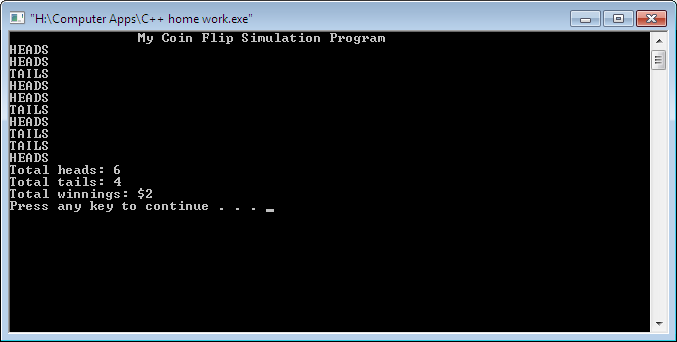Write a program that simulates 10-flips of a coin. Write a function names coinToss that simulates the tossing of a coin. When you call the function, it should generate a random number in the range 1 through 2. If the random number is 1, the function should display “Head”, otherwise, “Tails”.
Every time head comes up, the player wins $1; every time tail comes up, the player loses $1. Write another function named calculateTotal that adds up the player’s winnings after 10 flips of the coin. Your program should produce random results.
Output:

Code:
#include <string>
#include <time.h>
#include <cstdlib>
#include <ctime>
#include <iostream>
#include <windows.h>
using namespace std;
int coinToss();
float calculateTotal(int number, float money);
int main(int argv, char argc[])
{
int number;
float money = 0;
int head = 0;
int tail = 0;
cout<<"\t\tMy Coin Flip Simulation Program"<<endl;
for(int i = 0; i < 10; i++)
{
number = coinToss();
if(number == 1)
{
cout<<"HEADS"<<endl;
money = calculateTotal(number,money);
head ++;
}
else
{
cout<<"TAILS"<<endl;
money = calculateTotal(number,money);
tail ++;
}
Sleep(1000);
}
cout<<"Total heads: "<<head<<endl;
cout<<"Total tails: "<<tail<<endl;
cout<<"Total winnings: $"<<money<<endl;
system("pause");
return 0;
}
float calculateTotal(int number, float money)
{
if(number == 1)
{
money = money + 1.0;
}
else
{
money = money - 1.0;
}
return money;
}
int coinToss()
{
int num;
srand ((unsigned) time(0));
num = rand()%2 + 1;
return num;
}